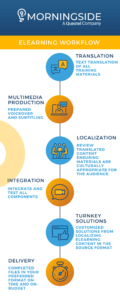As a global organization, localization of eLearning content is essential for training current and new team members. Of course, it can be challenging to develop multilingual eLearning courses that will successfully communicate to various learners across borders, languages, and cultures.
That means the numerous elements supported in eLearning modules, such as captions, slides, image text, and video, must be thoughtfully delivered to each intended audience without losing any of the original content’s meaning. This often requires careful planning and a significant amount of work.
Localized courses allow for increased comprehension, lower costs, and higher retention. Who you partner with can significantly reduce your workload and costs – and partnering with an experienced language service provider (LSP) means avoiding costly and time-consuming detours and bottlenecks during international eLearning course creation and production.
Should you decide to offer localized multilingual eLearning courses to your global organization, we have created an eBook, “Best Practices for Producing Multilingual eLearning Courses,” available for download. Here are some initial tips you should know, and you can receive our complimentary guide for more.
eLearning Training Tips for Content Creation
When you start working on developing content for your new multilingual eLearning training course, follow these six tips to make future translation attempts easier:
- Don’t use slang or local jargon
- Know your audience and their reading level
- Avoid using passive voice
- Use lists
- Expect expanding text
- Cultural considerations
Working with an LSP
Once you’ve selected a translation company, there are five things you can do to improve accuracy and consistency and simultaneously reduce your costs:
- Create a glossary
- Supply style guides
- Select an in-house liaison
- Simplify graphic design work
- Utilize translation memory
The Final Steps
Once you have completed the production of your translated eLearning course, we recommend implementing the following final checks:
- SCORM testing– Ensures all clicks/touches, transitions, timing, tests, and quizzes work as expected.
- Student sample survey– If time allows, a small group in each target country tests the user experience and comments on the completed course.
A Reliable Solution
Morningside has a rigorous eLearning localization workflow that is thorough and standardized to create accurate, high-quality localized courses. We have over 20 years of experience working with more than 13 authoring tools in many different subject areas. Global 500 companies worldwide trust us to create and deliver their multimedia content in all required formats. Our full suite of services includes graphics, voiceovers, subtitles, and more.

Contact Morningside today to learn how our team of experienced project managers, linguists, voiceover talents and technical experts can ensure that your eLearning courses and modules are analyzed efficiently, translated and localized accurately, and delivered on time and on budget.
About Us
Morningside, a Questel Company, is a recognized leader in eLearning translation, providing a full range of language and multimedia services to help you deliver instruction and content to employees, end users, and customers around the globe. Whether your focus is educating and orienting a global workforce or delivering on-demand research and collaboration, Morningside has the expert knowledge and proven experience to help you make the most of your global learning and training programs. We provide fast turnaround times, unparalleled accuracy and 24-hour customer support, with a proven track record of delivering projects on time and on budget.



